初中英语八年级上册一般将来时练习题含答案)资料讲解
英语一般将来时试题(有答案和解析)含解析
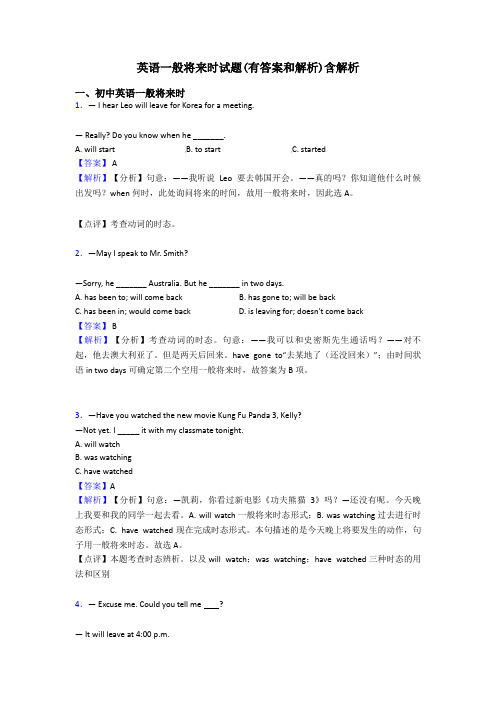
英语一般将来时试题(有答案和解析)含解析一、初中英语一般将来时1.— I hear Leo will leave for Korea for a meeting.— Really? Do you know when he _______.A. will startB. to startC. started【答案】 A【解析】【分析】句意:——我听说Leo要去韩国开会。
——真的吗?你知道他什么时候出发吗?when何时,此处询问将来的时间,故用一般将来时,因此选A。
【点评】考查动词的时态。
2.—May I speak to Mr. Smith?—Sorry, he _______ Australia. But he _______ in two days.A. has been to; will come backB. has gone to; will be backC. has been in; would come backD. is leaving for; doesn't come back【答案】 B【解析】【分析】考查动词的时态。
句意:——我可以和史密斯先生通话吗?——对不起,他去澳大利亚了。
但是两天后回来。
have gone to“去某地了(还没回来)”;由时间状语in two days可确定第二个空用一般将来时,故答案为B项。
3.—Have you watched the new movie Kung Fu Panda 3, Kelly?—Not yet. I _____ it with my classmate tonight.A. will watchB. was watchingC. have watched【答案】A【解析】【分析】句意:—凯莉,你看过新电影《功夫熊猫3》吗?—还没有呢。
今天晚上我要和我的同学一起去看。
A. will watch一般将来时态形式;B. was watching过去进行时态形式;C. have watched现在完成时态形式。
【英语】英语一般将来时练习题含答案含解析
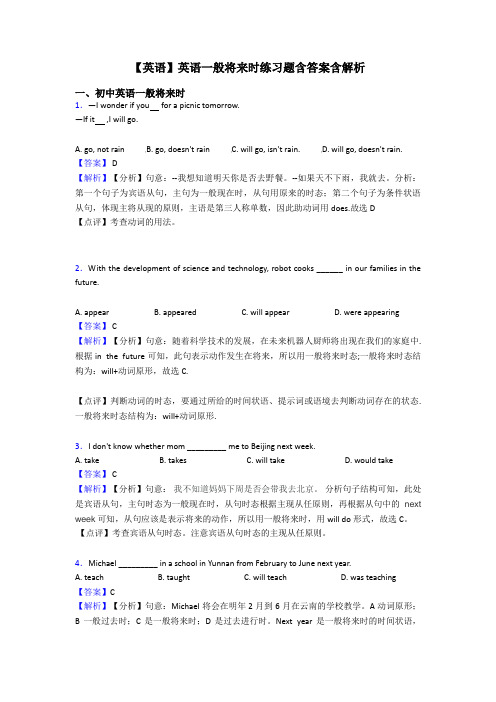
【英语】英语一般将来时练习题含答案含解析一、初中英语一般将来时1.—I wonder if you for a picnic tomorrow.—If it ,I will go.A. go, not rainB. go, doesn't rainC. will go, isn't rain.D. will go, doesn't rain.【答案】 D【解析】【分析】句意:--我想知道明天你是否去野餐。
--如果天不下雨,我就去。
分析:第一个句子为宾语从句,主句为一般现在时,从句用原来的时态;第二个句子为条件状语从句,体现主将从现的原则,主语是第三人称单数,因此助动词用does.故选D【点评】考查动词的用法。
2.With the development of science and technology, robot cooks ______ in our families in the future.A. appearB. appearedC. will appearD. were appearing【答案】 C【解析】【分析】句意:随着科学技术的发展,在未来机器人厨师将出现在我们的家庭中. 根据in the future可知,此句表示动作发生在将来,所以用一般将来时态;一般将来时态结构为:will+动词原形,故选C.【点评】判断动词的时态,要通过所给的时间状语、提示词或语境去判断动词存在的状态. 一般将来时态结构为:will+动词原形.3.I don't know whether mom _________ me to Beijing next week.A. takeB. takesC. will takeD. would take【答案】 C【解析】【分析】句意:我不知道妈妈下周是否会带我去北京。
分析句子结构可知,此处是宾语从句,主句时态为一般现在时,从句时态根据主现从任原则,再根据从句中的next week可知,从句应该是表示将来的动作,所以用一般将来时,用will do形式,故选C。
英语一般将来时专题练习(及答案)含解析
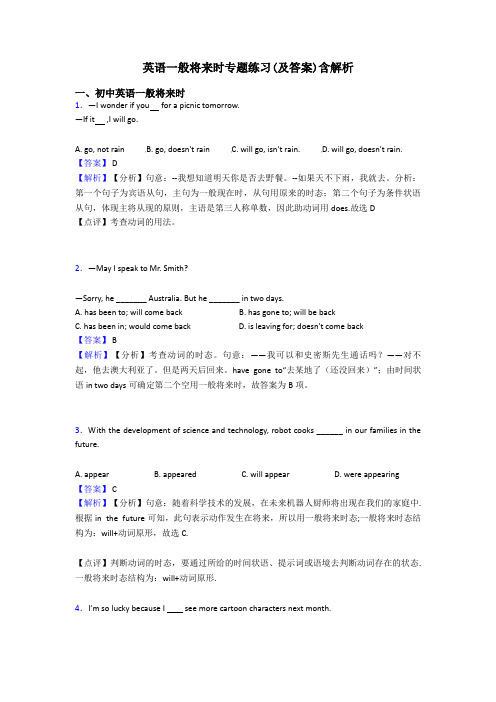
英语一般将来时专题练习(及答案)含解析一、初中英语一般将来时1.—I wonder if you for a picnic tomorrow.—If it ,I will go.A. go, not rainB. go, doesn't rainC. will go, isn't rain.D. will go, doesn't rain.【答案】 D【解析】【分析】句意:--我想知道明天你是否去野餐。
--如果天不下雨,我就去。
分析:第一个句子为宾语从句,主句为一般现在时,从句用原来的时态;第二个句子为条件状语从句,体现主将从现的原则,主语是第三人称单数,因此助动词用does.故选D【点评】考查动词的用法。
2.—May I speak to Mr. Smith?—Sorry, he _______ Australia. But he _______ in two days.A. has been to; will come backB. has gone to; will be backC. has been in; would come backD. is leaving for; doesn't come back【答案】 B【解析】【分析】考查动词的时态。
句意:——我可以和史密斯先生通话吗?——对不起,他去澳大利亚了。
但是两天后回来。
have gone to“去某地了(还没回来)”;由时间状语in two days可确定第二个空用一般将来时,故答案为B项。
3.With the development of science and technology, robot cooks ______ in our families in the future.A. appearB. appearedC. will appearD. were appearing【答案】 C【解析】【分析】句意:随着科学技术的发展,在未来机器人厨师将出现在我们的家庭中. 根据in the future可知,此句表示动作发生在将来,所以用一般将来时态;一般将来时态结构为:will+动词原形,故选C.【点评】判断动词的时态,要通过所给的时间状语、提示词或语境去判断动词存在的状态. 一般将来时态结构为:will+动词原形.4.I’m so lucky because I see more cartoon characters next month.A. is able toB. will be able toC. be able toD. was able to【答案】B【解析】【分析】句意:我真幸运因为我下个月能看到更多的卡通人物。
英语一般将来时专题练习(及答案)及解析
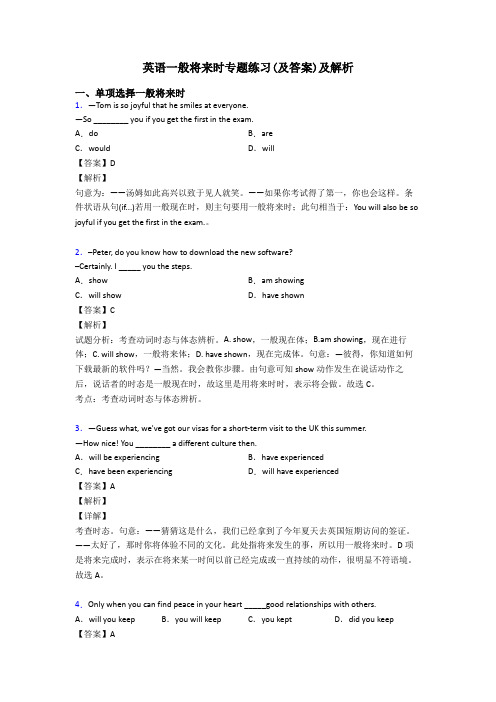
C.would have increasedD.will be increasing
【答案】B
【解析】
试题分析:考查时态。If条件句使用的是一般现在时代替一般将来时,所以主句也是一般将来时,和next year搭配使用。句意:如果我们的营销计划成功,我们明年销售将增加百分之三十。故B正确。
【解析】
句意为:——汤姆如此高兴以致于见人就笑。——如果你考试得了第一,你也会这样。条件状语从句(if...)若用一般现在时,则主句要用一般将来时;此句相当于:You will also be so joyful if you get the first in the exam.。
2.–Peter, do you know how to download the new software?
19.If he ________ exercise, he______ healthy.
A.not; will B.isn’t; won’t be
C.doesn’t; will be D.doesn’t do; won’t be
【答案】D
【解析】
【详解】
考查if条件句中的时态。句意:如果他不做运动,他就不会健康。If条件句,如果主句用一般将来时态,则从句用一般现在时态,且句子主语是he,单数第三人称,故选D。
考点:考查时态
10.It is required that the students _____ mobile phones in their school, so seldom _____ them using one.
A.should not use; you will see
一般将来时讲解及练习(含答案)
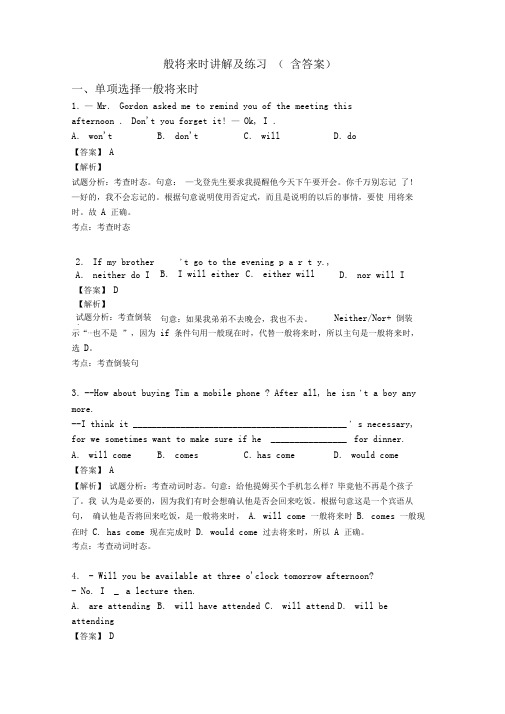
般将来时讲解及练习(含答案)一、单项选择一般将来时1.—Mr.Gordon asked me to remind you of the meeting thisafternoon .Don't you forget it! —Ok, I .A.won't B.don't C.will D.do【答案】A【解析】试题分析:考查时态。
句意:—戈登先生要求我提醒他今天下午要开会。
你千万别忘记了!—好的,我不会忘记的。
根据句意说明使用否定式,而且是说明的以后的事情,要使用将来时。
故A 正确。
考点:考查时态2.If my brother doesn 't go to the evening p a r t y.,A.neither do I B.I will either C.either willI D.nor will I【答案】D 【解析】试题分析:考查倒装句:句意:如果我弟弟不去晚会,我也不去。
Neither/Nor+ 倒装句,表示“⋯也不是”,因为if 条件句用一般现在时,代替一般将来时,所以主句是一般将来时,选D。
考点:考查倒装句3.--How about buying Tim a mobile phone ? After all, he isn 't a boy any more.--I think it _____________________________________________ ' s necessary, for we sometimes want to make sure if he ________________ for dinner. A.will come B.comes C.has come D.would come【答案】A【解析】试题分析:考查动词时态。
句意:给他提姆买个手机怎么样?毕竟他不再是个孩子了。
我认为是必要的,因为我们有时会想确认他是否会回来吃饭。
八年级英语一般将来时练习题50题答案解析版

八年级英语一般将来时练习题50题答案解析版1.She _____ visit her grandparents tomorrow.A.willB.isC.wasD.are答案解析:A。
选项B、D 后面接动词的-ing 形式或形容词,不能直接接动词原形;选项C 表示过去,与题目中的tomorrow 不符。
“will + 动词原形”表示将来。
2.They _____ have a picnic if the weather is fine.A.willB.areC.wereD.is答案解析:A。
选项B、D 后面接动词的-ing 形式或形容词,不能直接接动词原形;选项C 表示过去,与题目中的语境不符。
“will + 动词原形”可用于表示在某种条件下的将来动作。
3.We _____ go to the park after school.A.willB.areC.wereD.is答案解析:A。
选项B、D 后面接动词的-ing 形式或形容词,不能直接接动词原形;选项C 表示过去,与题目中的语境不符。
“will + 动词原形”用于表示将来的计划。
4.He _____ play basketball with his friends this weekend.A.willB.isC.wasD.are答案解析:A。
选项B、D 后面接动词的-ing 形式或形容词,不能直接接动词原形;选项C 表示过去,与题目中的this weekend 不符。
“will + 动词原形”表示将来的活动安排。
5.I _____ read a book tonight.A.willB.isC.wasD.are答案解析:A。
选项B、D 后面接动词的-ing 形式或形容词,不能直接接动词原形;选项 C 表示过去,与题目中的tonight 不符。
“will + 动词原形”用于表示将来的打算。
6.They _____ study for the test tomorrow.A.willB.isD.are答案解析:A。
初中英语一般将来时讲解与练习(含答案)

一般将来时讲解与练习一、概念:一般将来时表示将来某个时间要发生的动作或存在的状态,及计划、打算或准备做某事。
常常与表示将来的时间状语连用。
如:tomorrow,next day(week, month, year…),soon,the day after tomorrow(后天)等。
二、常用的表达形式共有五种,现归纳如下:(一)“will +动词原形”这一形式,主要用于在以下几个方面:1、表示单纯的未来“将要”通用于各个人称。
eg:They will go to visit the factory tomorrow. 明天他们将去工厂参观。
I’ll come with Wang Bing and Yang Ling. 我将和王兵、杨玲一起来。
The rain will stop soon. 雨很快就要停了。
2、表示不以人的意志为转移的自然发展的未来的事。
eg:Today is Saturday. Tomorrow will be Sunday. 今天是星期六。
明天是(将)是星期日。
He will be thirty years old this time next year. 明年这个时候他就(将)三十岁。
3、问对方是否愿意做某事或表示客气地邀请或命令。
eg: Will you please turn on the radio? 请打开收音机好吗?Will you go to the zoo with me? 你和我一起去动物园好吗?Shall we go there at five? 我们五点钟去那儿,好吗?Will you please open the door? 请你把门打开,好吗?注:在口语中will用于所有人称,书面语中第一人称常用shall。
(二)“be going to+动词原形”的形式,表示事先经过考虑、安排好打算、计划要做的事情以及已有迹象表明必将发生某事,意为“打算;就要”。
初二上册英语一般将来时讲解及练习(完整资料).doc

此文档下载后即可编辑一般将来时一.概念表示将要发生的动作或存在的状态及打算、计划或准备做某事。
二.标志tomorrow, next day(week, month, year…) soon, in a few minutes, by…, the day after tomorrow,三.结构主语+am/is/are going to + do;主语+will/shall + do.(shall 只可用于第一人称即we / I shall…,will可用于任何人称)否定:若谓语动词是be动词主语+was/were + not+其他若谓语动词是其他实意动词主语+ didn't+do+其他一般疑问句:若谓语动词是be动词be+主语+其他若谓语动词是其他实意动词will/shall+主语+其他四.用法1. 表示临时的决定,只能用will 加动词原形。
-You‘ve left the light on.-Oh,so I have. I‘ll go and turn it off.2. 在祈使句+and/or+陈述句句型中,陈述句中只能用will或情态动词加动词原形。
Work hard,and you will pass the exam.3. 在条件句中表示将来不用will,而用一般现在时、be going to(打算)或be to(为人所控制的动作)等。
若你见到在条件句中用了will,那will 就是表示愿意的情态动词。
Let her do that if she will.4.am/is/are going to 加动词原形,表示主语的意图或打算将来做的事。
What are you going to do tomorrow?The play is going to be produced next month.注意:已有迹象表明将要发生的事,只能用am/is/are加动词原形。
Look at the dark clouds;it‘s going to rain.1.单项选择1). There __________ a meeting tomorrow afternoon.A. will be going toB. will going to beC. is going to beD. will go to be2). Charlie ________ here next month.A. isn’t workingB. doesn’t workingC. isn’t going to workingD. won’t work3. He ________ very busy this week, he ________ free next week.A. will be; isB. is; isC. will be; will beD. is; will be4. There ________ a dolphin show in the zoo tomorrow evening.A. wasB. is going to haveC. will haveD. is going to be5. –________ you ________ free tomorrow?– No. I ________ free the day after tomorrow.A. Are; going to; willB. Are; going to be; willC. Are; going to; will beD. Are; going to be; will be6. Mother ________ me a nice present on my next birthday.A. will givesB. will giveC. givesD. give7. – Shall I buy a cup of tea for you?–________. (不,不要。
初中英语 人教版八年级上册语法专项-一般将来时讲解+时态混合练习题(含答案)

一般将来时讲解与时态混合练习题“be going to+动词原形”是一般将来时的一种表达形式,表示将要发生的动作或情况,be动词随主语的人称和数的变化而变化。
1.肯定句:主语+be going to+动词原形+其他2.否定句:主语+be not going to+动词原形+其他.3.一般疑问句:Be+主语+going to+动词原形+其他?肯定回答:Yes,主+be.否定回答:No,主语+be not.4.特殊疑问句:疑问词+be+主语+going to+动词原形+其他?用法:(1)表示将要发生的动作或安排,或打算、计划、决定要做的事。
(2)表示主语根据当前的情况做出的预测。
通常是有迹象表明某事即将发生,表达说话人较肯定的判断,指即将发生或肯定要发生的事,常用于I'm sure,I'm afraid或I think等后面。
(3)常与be going to连用的时间状语be going to 表达的是未发生的动作,因此常与一些表示将来的时间状语连用。
例如:tomorrow,this evening,next month,in three weeks等。
有时也可与before, after等引导的时间状语从句连用。
一般将来时1)一般将来时的构成:1. 助动词will(shall)+动词原形2. am / is / are+going to +动词原形2)一般将来时的用法:1.将要发生的动作。
例如:I will leave for Beijing tomorrow.2.将要存在的状态。
例如:This time next year I will be in Japan. Where will you be?3.打算要做的事。
例如:Are you going to watch the film on television tonight?3)常用于一般将来时的时间状语:tomorrow、next week、in 2008等。
一般将来时讲解(附习题+答案)

一般将来时讲解(附习题+答案)一、一般将来时的含义:表示动作发生在将来二、一般将来时的句型:(1) will/shall+动词原形(2) be going to+动词原形三、一般将来时的时间状语:tomorrow(明天)、the day after tomorrow(后天)、next...(下一...): next week(下一周)、next year(明年)、next month(下个月)in+一段时间(...之后): in three days(三天之后)、in the future在未来this evening(今天晚上)四、一般将来时的句型结构:(1) will/shall+动词原形(will not =won’t)(will 各种人称均可用,shall 只能用于第一人称)1)肯定句:主语+will/shall+动词原型...如:I will go to school tomorrow.我明天将会去学校He will go to school tomorrow.他明天将会去学校。
2)否定句:主语+will/shall+not+动词原型...如:I won’t go to school tomorrow.我明天将不会去学校。
He won’t go to school tomorrow.他明天将不会去学校。
3)一般疑问句:Will/Shall +主语+动词原型...如:Will you go to school tomorrow?你明天要去学校吗?Will he go to school tomorrow?他明天要去学校吗?肯定回答:Yes, 主语+will.如:Yes, I will.Yes, he will.否定回答:No,主语+will+not.如:No, I won’t.No, he won’t.4) 特殊疑问句:特殊疑问词+will/shall+主语+动词原型...如:What will you do tomorrow?你明天将会做什么?What will he do tomorrow?他明天将会做什么?(2) be going to+动词原形1)肯定句:主语+be going to +动词原型...如:I am going to buy some books tomorrow.我明天打算去买一些书。
(英语)英语一般将来时答题技巧及练习题(含答案)含解析

(英语)英语一般将来时答题技巧及练习题(含答案)含解析一、初中英语一般将来时1.—I wonder if he ______ us tonight.— I believe if he ______ his homework, he will join us.A. will join; will finishB. will join; finishesC. joins; finishes.【答案】 B【解析】【分析】句意:——我想知道他今天晚上是否加入我们吗?——我相信如果他完成了作业,他会加入我们的。
根据句式结构第一句是if是否,引导宾语从句,根据tonight,可知从句是将来时态;第二句if如果,引导条件状语从句,时态为主将从现,此空用一般现在时,finishes,故选B。
【点评】此题考查从句时态。
要根据不同的从句和不同的语境确定句子时态。
2.—May I speak to Mr. Smith?—Sorry, he _______ Australia. But he _______ in two days.A. has been to; will come backB. has gone to; will be backC. has been in; would come backD. is leaving for; doesn't come back【答案】 B【解析】【分析】考查动词的时态。
句意:——我可以和史密斯先生通话吗?——对不起,他去澳大利亚了。
但是两天后回来。
have gone to“去某地了(还没回来)”;由时间状语in two days可确定第二个空用一般将来时,故答案为B项。
3.Look on the bright side of life,and imagine that you ______ a happy and successful future.A. hadB. will haveC. haveD. have had【答案】 B【解析】【分析】考查时态.句意"看看生活中美好的一面,想象你会有一个幸福和成功的未来.".A过去时.B一般将来时态.C动词原形.D现在完成时态.结合语境"看看生活中美好的一面,想象你___一个幸福和成功的未来.",由future未来,可知,表示将来,用一般将来时态.答案是B.4.— There ________a football match on TV tonight. I can't wait to watch it.— Me, too. It's ________ Guangzhou Evergrande and the Australian team Melbourne Victory.A. will be; betweenB. will be; bothC. will have; betweenD. will have; both【答案】A【解析】【分析】句意为:---今晚将有一场电视直播足球比赛,我非常想看。
(英语)英语一般将来时练习题含答案含解析
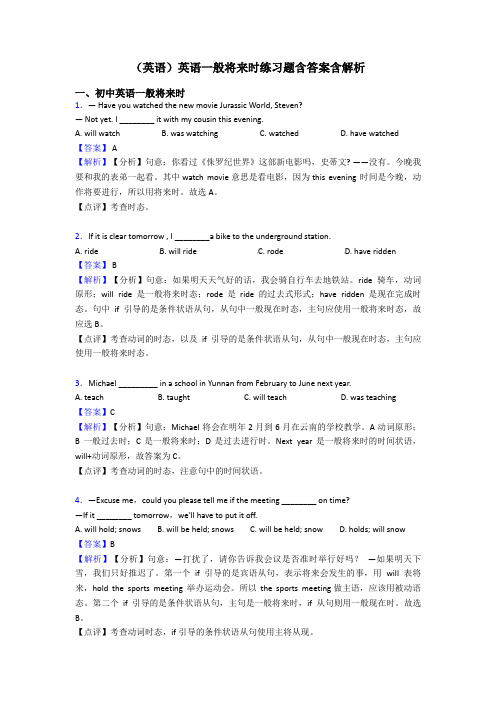
(英语)英语一般将来时练习题含答案含解析一、初中英语一般将来时1.— Have you watched the new movie Jurassic World, Steven?— Not yet. I ________ it with my cousin this evening.A. will watchB. was watchingC. watchedD. have watched【答案】 A【解析】【分析】句意:你看过《侏罗纪世界》这部新电影吗,史蒂文? ——没有。
今晚我要和我的表弟一起看。
其中watch movie意思是看电影,因为this evening 时间是今晚,动作将要进行,所以用将来时。
故选A。
【点评】考查时态。
2.If it is clear tomorrow , I ________a bike to the underground station.A. rideB. will rideC. rodeD. have ridden【答案】 B【解析】【分析】句意:如果明天天气好的话,我会骑自行车去地铁站。
ride骑车,动词原形;will ride是一般将来时态;rode是ride的过去式形式;have ridden是现在完成时态。
句中if引导的是条件状语从句,从句中一般现在时态,主句应使用一般将来时态,故应选B。
【点评】考查动词的时态,以及if引导的是条件状语从句,从句中一般现在时态,主句应使用一般将来时态。
3.Michael _________ in a school in Yunnan from February to June next year.A. teachB. taughtC. will teachD. was teaching【答案】C【解析】【分析】句意:Michael将会在明年2月到6月在云南的学校教学。
A动词原形;B一般过去时;C是一般将来时;D是过去进行时。
(完整版)初中一般将来时专项练习题和答案解析
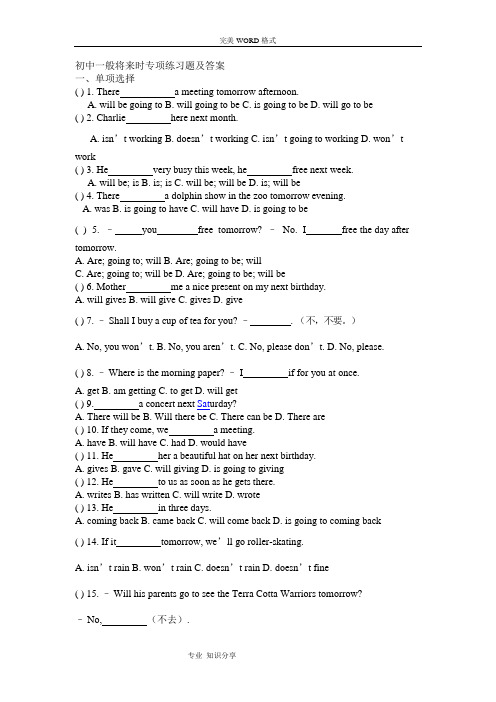
初中一般将来时专项练习题及答案一、单项选择( ) 1. There a meeting tomorrow afternoon.A. will be going toB. will going to beC. is going to beD. will go to be( ) 2. Charlie here next month.A. isn’t workingB. doesn’t workingC. isn’t going to workingD. won’t work( ) 3. He very busy this week, he free next week.A. will be; isB. is; isC. will be; will beD. is; will be( ) 4. There a dolphin show in the zoo tomorrow evening.A. wasB. is going to haveC. will haveD. is going to be( ) 5. –you free tomorrow? –No. I free the day after tomorrow.A. Are; going to; willB. Are; going to be; willC. Are; going to; will beD. Are; going to be; will be( ) 6. Mother me a nice present on my next birthday.A. will givesB. will giveC. givesD. give( ) 7. –Shall I buy a cup of tea for you? –. (不,不要。
)A. No, you won’t.B. No, you aren’t.C. No, please don’t.D. No, please. ( ) 8. –Where is the morning paper? –I if for you at once.A. getB. am gettingC. to getD. will get( ) 9. a concert next Sat urday?A. There will beB. Will there beC. There can beD. There are( ) 10. If they come, we a meeting.A. haveB. will haveC. hadD. would have( ) 11. He her a beautiful hat on her next birthday.A. givesB. gaveC. will givingD. is going to giving( ) 12. He to us as soon as he gets there.A. writesB. has writtenC. will writeD. wrote( ) 13. He in three days.A. coming backB. came backC. will come backD. is going to coming back ( ) 14. If it tomorrow, we’ll go roller-skating.A. isn’t rainB. won’t rainC. doesn’t rainD. doesn’t fine( ) 15. –Will his parents go to see the Terra Cotta Warriors tomorrow?–No, (不去).A. they willn’t.B. they won’t.C. they aren’t.D. they don’t.( ) 16. Who we swimming with tomorrow afternoon?A. will; goB. do; goC. will; goingD. shall; go( ) 17. We the work this way next time.A. doB. will doC. going to doD. will doing( ) 18. Tomorrow he a kite in the open air first, and then boating in the park.A. will fly; will goB. will fly; goesC. is going to fly; will goesD. flies; will go ( ) 19. The day after tomorrow they a volleyball match.A. will watchingB. watchesC. is watchingD. is going to watch( ) 20. There a birthday party this Sunday.A. shall beB. will beC. shall going to beD. will going to be( ) 21. They an English evening next Sunday.A. are havingB. are going to haveC. will havingD. is going to have( ) 22. you free next Sunday?A. Will; areB. Will; beC. Do; beD. Are; be( ) 23. He there at ten tomorrow morning.A. willB. isC. will beD. be( ) 24. your brother a magazine from the library?A. Are; going to borrowB. Is; going to borrowC. Will; borrowsD. Are; going to borrows( ) 25. –Shall I come again tomorrow afternoon? –(好的).A. Yes, pleaseB. Yes, you will.C. No, please.D. No, you won’t.( ) 26. It the year of the horse next year.A. is going to beB. is going toC. will beD. will is( ) 27. open the window?A. Will you pleaseB. Please will youC. You pleaseD. Do you( ) 28. –Let’s go out to play football, shall we? –OK. I .A. will comingB. be going to comeC. comeD. am coming( ) 29. It us a long time to learn English well.A. takesB. will takeC. spendsD. will spend( ) 30. The train at 11.A. going to arriveB. will be arriveC. is going toD. is arriving二、动词填空。
人教版英语八年级上册 Unit6-7语法重点:一般将来时_专项讲解与练习 (有答案)
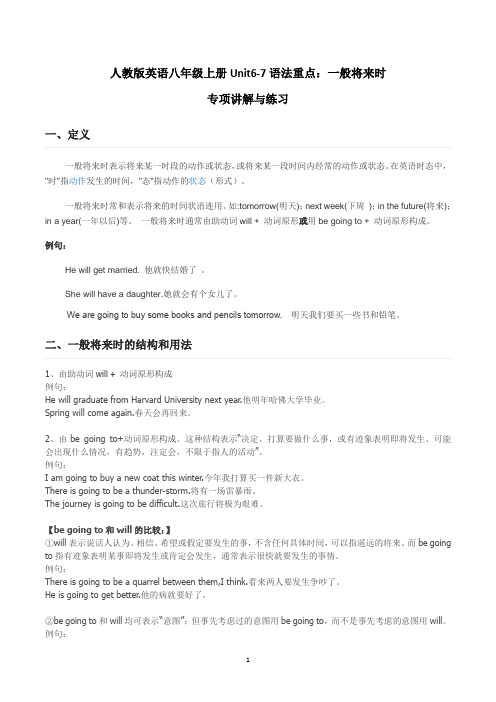
人教版英语八年级上册Unit6-7语法重点:一般将来时专项讲解与练习一般将来时表示将来某一时段的动作或状态,或将来某一段时间内经常的动作或状态。
在英语时态中,"时"指动作发生的时间,"态"指动作的状态(形式)。
一般将来时常和表示将来的时间状语连用。
如:tomorrow(明天);next week(下周);in the future(将来);in a year(一年以后)等。
一般将来时通常由助动词will + 动词原形或用be going to + 动词原形构成。
例句:He will get married. 他就快结婚了。
She will have a daughter.她就会有个女儿了。
We are going to buy some books and pencils tomorrow. 明天我们要买一些书和铅笔。
1、由助动词will + 动词原形构成例句:He will graduate from Harvard University next year.他明年哈佛大学毕业。
Spring will come again.春天会再回来。
2、由be going to+动词原形构成。
这种结构表示“决定、打算要做什么事,或有迹象表明即将发生、可能会出现什么情况,有趋势,注定会,不限于指人的活动”。
例句:I am going to buy a new coat this winter.今年我打算买一件新大衣。
There is going to be a thunder-storm.将有一场雷暴雨。
The journey is going to be difficult.这次旅行将极为艰难。
【be going to和will的比较:】①will表示说话人认为、相信、希望或假定要发生的事,不含任何具体时间,可以指遥远的将来。
而be going to指有迹象表明某事即将发生或肯定会发生,通常表示很快就要发生的事情。
人教版英语八年级上册 Unit6-7语法重点:一般将来时_专项讲解与练习 (有答案)

人教版英语八年级上册Unit6-7语法重点:一般将来时专项讲解与练习一般将来时表示将来某一时段的动作或状态,或将来某一段时间内经常的动作或状态。
在英语时态中,"时"指动作发生的时间,"态"指动作的状态(形式)。
一般将来时常和表示将来的时间状语连用。
如:tomorrow(明天);next week(下周);in the future(将来);in a year(一年以后)等。
一般将来时通常由助动词will + 动词原形或用be going to + 动词原形构成。
例句:He will get married. 他就快结婚了。
She will have a daughter.她就会有个女儿了。
We are going to buy some books and pencils tomorrow. 明天我们要买一些书和铅笔。
1、由助动词will + 动词原形构成例句:He will graduate from Harvard University next year.他明年哈佛大学毕业。
Spring will come again.春天会再回来。
2、由be going to+动词原形构成。
这种结构表示“决定、打算要做什么事,或有迹象表明即将发生、可能会出现什么情况,有趋势,注定会,不限于指人的活动”。
例句:I am going to buy a new coat this winter.今年我打算买一件新大衣。
There is going to be a thunder-storm.将有一场雷暴雨。
The journey is going to be difficult.这次旅行将极为艰难。
【be going to和will的比较:】①will表示说话人认为、相信、希望或假定要发生的事,不含任何具体时间,可以指遥远的将来。
而be going to指有迹象表明某事即将发生或肯定会发生,通常表示很快就要发生的事情。
- 1、下载文档前请自行甄别文档内容的完整性,平台不提供额外的编辑、内容补充、找答案等附加服务。
- 2、"仅部分预览"的文档,不可在线预览部分如存在完整性等问题,可反馈申请退款(可完整预览的文档不适用该条件!)。
- 3、如文档侵犯您的权益,请联系客服反馈,我们会尽快为您处理(人工客服工作时间:9:00-18:30)。
初中英语八年级上册一般将来时练习题含答案)初中英语八年级上册一般将来时练习题姓名:分数:一、单项选择(每小题3分)( ) 1. There __________ a meeting tomorrow afternoon.A. will be going toB. will going to beC. is going to beD. will go to be( ) 2. Charlie ________ here next month.A. isn’t workingB. doesn’t workingC. isn’t going to workingD. won’t work( ) 3. He ________ very busy this week, but he ________ free next week.A. will be; isB. is; isC. will be; will beD. is; will be( ) 4. There ________ a dolphin show in the zoo tomorrow evening.A. wasB. is going to haveC. will haveD. is going to be( ) 5. –_____ you ______ free tomorrow?– No. I _____ free the day after tomorrow.A. Are; going to; willB. Are; going to be; willC. Are; going to; will beD. Are; going to be; will be( ) 6. Mother ________ me a nice present on my next birthday.A. will givesB. will giveC. givesD. give( ) 7. – Shall I buy a cup of tea for you?–________. (不,不要。
)A. No, you won’t.B. No, you aren’t.C. No, thanks.D. No, please.( ) 8. – Where is the morning paper?– I ________ it for you at once.A. getB. am gettingC. to getD. will get( ) 9. ________ a concert next Saturday?A. There will beB. Will there beC. There can beD. There are( ) 10. If they come, we ________ a meeting.A. haveB. will haveC. hadD. would have( ) 11. He ________ her a beautiful hat on her next birthday.A. givesB. gaveC. will givingD. is going to give( ) 12. He ________ to us as soon as he gets there.A. writesB. has writtenC. will writeD. wrote( ) 13. He ________ in three days.A. coming backB. came backC. will come backD. is going to coming back( ) 14. If it ________ tomorrow, we’ll go roller-skating.A. isn’t rainB. won’t rainC. doesn’t rainD. doesn’t f ine( ) 15. – Will his parents go to see the Terra Cotta Warriors tomorrow?– No, ________ (不去).A. they willn’t.B. they won’t.C. they aren’t.D. they don’t.( ) 16. Who ________ we ________ swimming with tomorrow afternoon?A. will; goB. do; goC. will; goingD. shall; go( ) 17. We ________ the work this way next time.A. doB. will doC. going to doD. will doing( ) 18. Tomorrow he ___ a kite in the open air first, and then ____ boating in the park.A. will fly; will goB. will fly; goesC. is going to fly; will goesD. flies; will go( ) 19. The day after tomorrow they ________ a volleyball match.A. will watchingB. watchesC. are watchingD. are going to watch( ) 20. There ________ a birthday party this Sunday.A. shall beB. will beC. shall going to beD. will going to be( ) 21. They ________ an English evening next Sunday.A. are havingB. are going to haveC. will havingD. is going to have( ) 22. ________ you ________ free next Sunday?A. Will; areB. Will; beC. Do; beD. Are; be( ) 23. He ________ there at ten tomorrow morning.A. willB. isC. will beD. be( ) 24. ________ your brother ________ a magazine from the library?A. Are; going to borrowB. Is; going to borrowC. Will; borrowsD. Are; going to borrows( ) 25. – Shall I come again tomorrow afternoon? –________ (好的).A. Yes, pleaseB. Yes, you will.C. No, please.D. No, you won’t.( ) 26. It ________ the year of the horse next year.A. is going to beB. is going toC. will beD. will is( ) 27. ________ open the window?A. Will you pleaseB. Please will youC. You pleaseD. Do you( ) 28. –Let’s go out to play football, shall we? – OK. I ________. A. will coming B. be going to come C. come D. am coming( ) 29. It ________ us a long time to learn English well.A. will takesB. will takeC. spendsD. will spend( ) 30. The train ________ at 11.A. going to arriveB. will be arriveC. is going toD. is arriving二、动词填空。
(每小题2分)1. I ______(leave)in a minute. I ______(finish)all my work beforeI ______ (leave).2. —What ______ you ______(do)after you ______(leave)here? —I ______________(return)home and ______(get)a job.3. I ______(be)tired. I ______(go)to bed early tonight.4. —_____ you _____(be)here this Saturday?—No. I ______(visit)my teacher.5. —______ I ______(get)you a copy of today’s newspaper?—Thank you.6. Most of us don’t think their team ______(win).三、把下列各句译成英语(每小题2分)1.我叔叔今晚要来这里。
2.他没有打算住那座小屋。
3.我们要读这本书。
4.——下个星期一你打算去干嘛? ——我想去打篮球。
一般将来时练习题答案参考答案:一、1. C 2. D 3. D 4. D 5. D 6. B 7. C 8. D9. B 10. B 11. D 12. C 13. C 14. C 15. B 16. D17. B 18. A 19. D 20. B 21. B 22. B 23. C 24. B25. A 26. A 27. A 28. D 29. B 30. D二、1. am leaving ; will finish ; leave 2. will ; do ; leave ; will return ; get3. am ; will go4. Will, be ; will visit5. Shall ; get6. will win三、1.My uncle will come here tonight.2.He isn't going to live in that small house.3.We are going to read this book.4.—What are you going to do next Monday? —I’m going to play basketball.。
